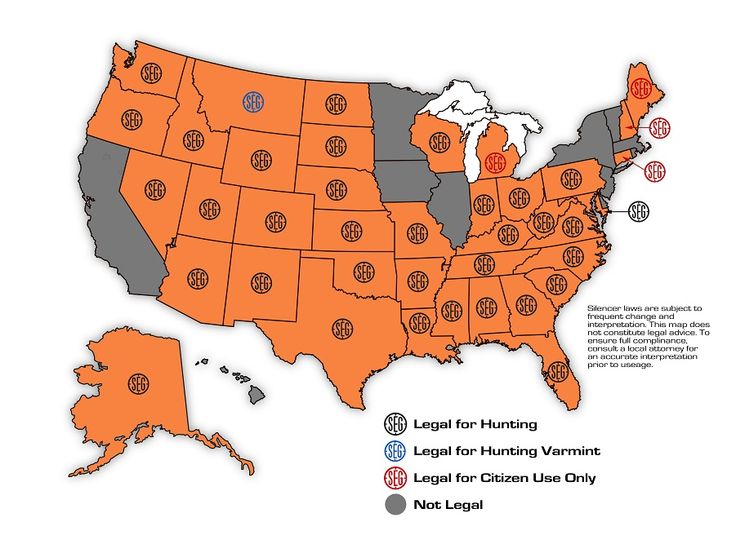
Are Suppressors Legal in Washington State? A Comprehensive Guide
The question of whether suppressors are legal in Washington State is a common one among firearm enthusiasts and those interested in reducing noise pollution. Understanding the laws surrounding firearm suppressors, also known as silencers, is crucial for anyone considering owning or using one in Washington. This article provides a comprehensive overview of the legality, regulations, and processes involved in owning suppressors in Washington State.
Federal Regulations on Suppressors
Before delving into Washington State-specific laws, it’s essential to understand the federal regulations governing suppressors. In the United States, suppressors are regulated under the National Firearms Act (NFA) of 1934 and the Gun Control Act (GCA) of 1968. These laws require individuals to go through a stringent process to legally own a suppressor.
- NFA Requirements: The NFA mandates that suppressors be registered with the Bureau of Alcohol, Tobacco, Firearms and Explosives (ATF).
- Background Checks: Prospective owners must undergo a thorough background check.
- Tax Stamp: A $200 tax stamp must be obtained for each suppressor.
- Transfer Process: The transfer of a suppressor involves submitting an ATF Form 4, which requires law enforcement notification and approval.
Washington State Laws on Suppressors
Washington State law aligns with federal regulations regarding suppressors. As of the latest updates, suppressors are legal in Washington State for individuals who comply with federal requirements. There are no state-specific laws that outright ban the ownership of suppressors, provided that federal laws are followed meticulously.
However, it is crucial to note that while suppressors are legal, their use may be restricted in certain circumstances. For example, using a suppressor while committing a crime can lead to enhanced penalties. It is also vital to be aware of local ordinances and regulations that may further restrict the use of suppressors in specific areas.
Acquiring a Suppressor in Washington State: A Step-by-Step Guide
Acquiring a suppressor in Washington State involves several steps, primarily dictated by federal law. Here’s a detailed guide:
- Find a Licensed Dealer: Locate a licensed firearms dealer in Washington State who specializes in NFA items, including suppressors.
- Select a Suppressor: Choose the suppressor you wish to purchase. The dealer will guide you through the available options and help you select one that meets your needs.
- Complete ATF Form 4: Fill out ATF Form 4, Application for Tax Paid Transfer and Registration of Firearm. This form requires detailed information about you and the suppressor.
- Fingerprints and Photographs: Obtain fingerprint cards and passport-style photographs, as required by the ATF.
- Submit Application: Submit the completed Form 4, fingerprints, photographs, and a check or money order for the $200 tax stamp to the ATF.
- Law Enforcement Notification: Send a copy of the Form 4 to your local chief law enforcement officer (CLEO). This is a notification requirement, and the CLEO’s approval is not required for the transfer to proceed.
- Wait for Approval: The ATF will conduct a background check and review your application. This process can take several months, sometimes up to a year or more.
- Receive Approved Form 4: Once your application is approved, the ATF will return the approved Form 4 with a tax stamp affixed.
- Take Possession of the Suppressor: Present the approved Form 4 to the dealer and take possession of your suppressor.
Legal Considerations and Restrictions
While suppressors are legal in Washington State, it’s important to understand the legal considerations and potential restrictions:
- Use in Criminal Activities: Using a suppressor in the commission of a crime carries severe penalties.
- Local Ordinances: Be aware of any local ordinances that may restrict the use of suppressors in certain areas, such as city parks or residential neighborhoods.
- Hunting Regulations: Check with the Washington Department of Fish and Wildlife (WDFW) regarding the legality of using suppressors for hunting. While generally allowed, specific regulations may apply.
- Transporting Suppressors: When transporting a suppressor, ensure it is stored securely and separately from the firearm. It is advisable to carry a copy of your approved Form 4 with you.
Benefits of Owning a Suppressor
There are several reasons why individuals choose to own suppressors. These include:
- Noise Reduction: The primary benefit is reducing the noise level of firearms, protecting the shooter’s hearing and minimizing disturbance to others.
- Improved Accuracy: Some shooters find that using a suppressor can improve their accuracy by reducing recoil and muzzle rise.
- Hunting: Suppressors can make hunting safer and more enjoyable by reducing noise pollution and protecting the hunter’s hearing.
- Tactical Applications: In certain tactical situations, suppressors can provide a tactical advantage by reducing the shooter’s signature.
Common Misconceptions About Suppressors
There are several common misconceptions about suppressors that should be addressed:
- Silence: Suppressors do not completely silence firearms. They reduce the noise level, but the firearm will still produce a sound.
- Criminal Use: While suppressors are sometimes associated with criminal activity, the vast majority of owners are law-abiding citizens who use them for legal purposes.
- Ease of Acquisition: Acquiring a suppressor is not easy. The process involves extensive background checks and a lengthy waiting period.
The Future of Suppressor Laws in Washington State
The legal landscape surrounding suppressors can change, so it’s essential to stay informed about any potential changes in Washington State law. [See also: Washington State Firearm Legislation Updates] Regularly check with the Washington State Legislature and reputable firearms organizations for updates.
In conclusion, suppressors are legal in Washington State as long as individuals comply with federal regulations. Understanding the laws, restrictions, and processes involved is crucial for anyone considering owning or using a suppressor. Always consult with legal professionals and stay informed about any changes in the law to ensure compliance.
Disclaimer: This article is for informational purposes only and does not constitute legal advice. Consult with a qualified attorney for advice regarding your specific situation.
